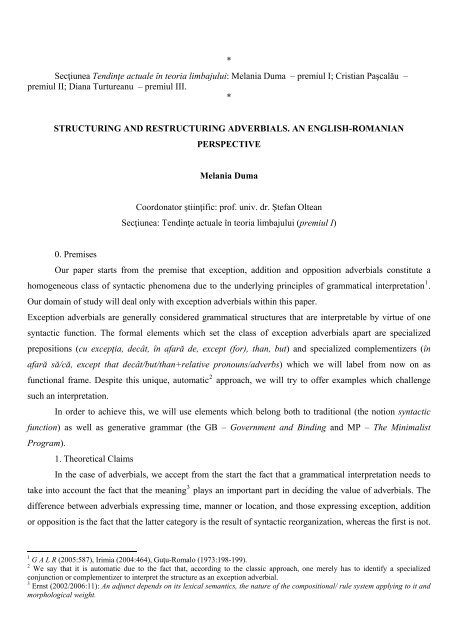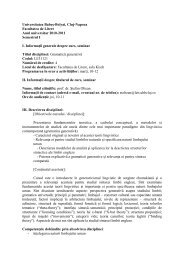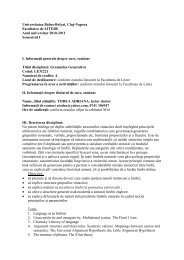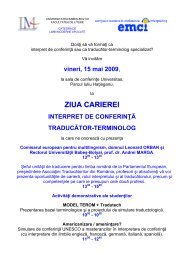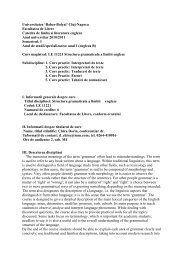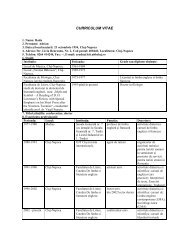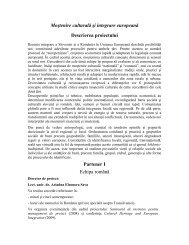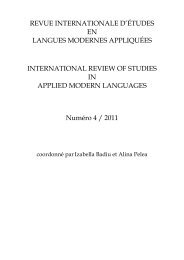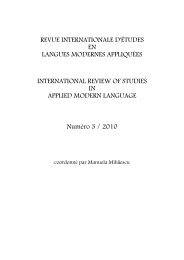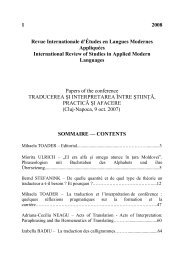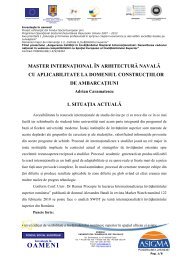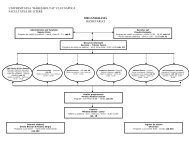Dimensiuni ale limbajului n context carceral
Dimensiuni ale limbajului n context carceral
Dimensiuni ale limbajului n context carceral
You also want an ePaper? Increase the reach of your titles
YUMPU automatically turns print PDFs into web optimized ePapers that Google loves.
Secţiunea Tendinţe actu<strong>ale</strong> în teoria <strong>limbajului</strong>: Melania Duma – premiul I; Cristian Paşcalău –<br />
premiul II; Diana Turtureanu – premiul III.<br />
*<br />
*<br />
STRUCTURING AND RESTRUCTURING ADVERBIALS. AN ENGLISH-ROMANIAN<br />
PERSPECTIVE<br />
Melania Duma<br />
Coordonator ştiinţific: prof. univ. dr. Ştefan Oltean<br />
Secţiunea: Tendinţe actu<strong>ale</strong> în teoria <strong>limbajului</strong> (premiul I)<br />
0. Premises<br />
Our paper starts from the premise that exception, addition and opposition adverbials constitute a<br />
homogeneous class of syntactic phenomena due to the underlying principles of grammatical interpretation 1 .<br />
Our domain of study will deal only with exception adverbials within this paper.<br />
Exception adverbials are generally considered grammatical structures that are interpretable by virtue of one<br />
syntactic function. The formal elements which set the class of exception adverbials apart are specialized<br />
prepositions (cu excepţia, decât, în afară de, except (for), than, but) and specialized complementizers (în<br />
afară să/că, except that decât/but/than+relative pronouns/adverbs) which we will label from now on as<br />
functional frame. Despite this unique, automatic 2 approach, we will try to offer examples which challenge<br />
such an interpretation.<br />
In order to achieve this, we will use elements which belong both to traditional (the notion syntactic<br />
function) as well as generative grammar (the GB – Government and Binding and MP – The Minimalist<br />
Program).<br />
1. Theoretical Claims<br />
In the case of adverbials, we accept from the start the fact that a grammatical interpretation needs to<br />
take into account the fact that the meaning 3 plays an important part in deciding the value of adverbials. The<br />
difference between adverbials expressing time, manner or location, and those expressing exception, addition<br />
or opposition is the fact that the latter category is the result of syntactic reorganization, whereas the first is not.<br />
1<br />
G A L R (2005:587), Irimia (2004:464), Guţu-Romalo (1973:198-199).<br />
2<br />
We say that it is automatic due to the fact that, according to the classic approach, one merely has to identify a specialized<br />
conjunction or complementizer to interpret the structure as an exception adverbial.<br />
3<br />
Ernst (2002/2006:11): An adjunct depends on its lexical semantics, the nature of the compositional/ rule system applying to it and<br />
morphological weight.


